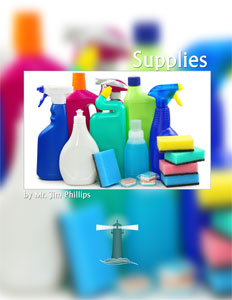SUPPLIES - MODULE 9
|
Items Used, Consumed and Replenished as a Matter of Daily Life
– From the everyday common to the less obvious, there is a plethora of different supplies utilized within all nine modules. The type, quantity and variety of supplies will vary somewhat for each individual household and situation. However, without an adequate supply of the necessities of life, we will perish. Beyond the bare necessities there are many consumables that make life much more tolerable, even enjoyable. Within each of the Nine Provident Living Modules are relevant supplies utilized in the course of working in each of the other eight areas. Without even thinking about it we consume many different items and just replenish them as needed. Herein lies a significant challenge. The difficulty comes in thinking ahead to put enough of the commonly used items into the family storehouse so they’ll be available as needed at a time when there’s no way of getting more. Thread is an example of a supply that is used in conjunction with a needle (which is a tool). In accomplishing the “work” of the needle, the thread is used up, whereas the needle is available to “work” once again. Likewise supplies like wood, propane, alcohol, charcoal, white gas, acetylene, paraffin, coal, and kerosene are all fuels that can be used and consumed in their respective appliances, while leaving their related tool ready to go again. The list of supplies covers a plethora of common and less common items starting with the easy to understand items such as food, water, detergent, batteries and toilet paper, etc. There are many less obvious supplies that one would want to have in store against a time of need, to name just a few: bailing wire, staples, cotton balls, nylon cord, thread, calcium hypochlorite, lantern wicks, sulfur, potassium nitrate, Dow Corning #4, starting fluid, ready mix cement, aluminum foil, beeswax, auto filters (air, gas and oil) ammonia, fabric, hydrogen peroxide, candle wicks, cream of tarter, pop rivets, white UV resistant duck tape, 100’ rolls of plastic sheet, salt lick, dental floss, beeswax, bearing grease, spools of rope, gripper screws, rock salt, nails, Molykote #33, lantern mantles, Green Slime, cheesecloth, fire brick, linseed oil, used plastic grocery bags, silicone caulk, wire coat hangers, sandpaper, fencing material, coffee urn spigots, candle wax, magnesium sulfate, spools of bailing twine, tire patching supplies, refractory cement, and a lot more. It is important to fully recognize all of the items that you consume and use up. The task is to determine which ones you truly must have in your private store in order to maintain a safe and livable environment. For some of the less common, yet very important things to have access to in a time of deprivation, consider having them in “common-unity” for shared use within your working group—i.e. “community”. V1.0 RD-2014.05.28 Link to the audio class "Suffer In Comfort" |
